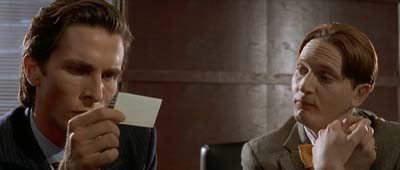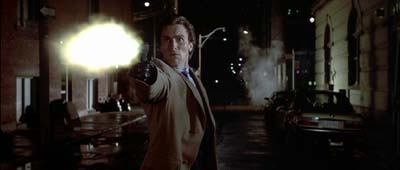American Psycho
Eighties chic meets serial-killing Wall Street brokers in this stunning diatribe on Reagan culture.

If you've ever read Bret Easton Ellis' novel American Psycho, you'll probably be flabbergasted that anyone would have the audacity to attempt to commit it to film. It's been said many times before that, like Naked Lunch before it, American Psycho is an unfilmable work. Mary Harron apparently wasn't listening, and has turned in a superb translation for this, her second feature.
That's not to say it's a faithful translation, mind you, as anyone expecting a bloodbath of quite the proportions envisaged in the book will tell you. Harron takes a much wiser route (and some would complain safer) by focussing more on the black humour woven through the original material than on the blood-letting. There's still plenty of that, mind you, just don't expect anything as extreme as someone having intercourse with a decapitated head, that's all.
For anyone unfamiliar, American Psycho the novel was released in 1991 to a mixture of adoring praise and outright revulsion. Having received much praise for previous effort Less Than Zero (also a movie, but considerably crapper than this), many were expecting a similarly safe piece for Ellis' second work. Oh dear. American Psycho is the sordid story of a Manhattan broker, Patrick Bateman (a stellar performance from Christian Bale), who also happens to be an insane serial killer. How so? It's set in the 'fuck them all' era of the eighties where Gordon Gecko famously told us "greed is good", and is a study of how the pursuit of wealth and possessions leads one man to the era's insane logical conclusion; outright bloody murder.
Bateman lives in a world of pressure where money and status are everything and simply having a beautiful fianc?e is far more important than actually loving her. His entire existence revolves around his perception of others and theirs of him. In a series of voice-overs by Bateman himself, we gradually come to appreciate the needless mundanity of his life. He explains to us the virtue of being able to do a thousand abdominal crunches every morning, and the benefits of non-alcoholic aftershaves. His wardrobe is, of course, exquisitely chosen from his favourite trendy designers (who also happen to be the favourite trendy designers of everyone else he knows), and he absolutely will not wear anything other than Oliver Peoples glasses. Oh, and never dismiss the quality of his business card...
In fact, business cards form the centre of my favourite scene, and one that demonstrates particularly well the petty grievances these men apparently hold against each other. During a comparison of new cards, Bateman gets admiring comments but is upstaged by first one colleague, then another and finally by Paul Allen (Jared Leto), whose card, to be perfectly honest, looks identical to Bateman's. Everyone else seems to see it differently, however, and Bateman himself is disturbed by such facets as "the tasteful thickness of it", and the very audacity of it having a watermark. Plainly, Allen must die, and die he does.

It's the film's first violent scene, and the first time we see the culmination of Bateman's selfish rage. Rendering Allen drunk on a visit to a terribly un-trendy eatery, Bateman lures him to his apartment where he puts the latest Huey Lewis and the News CD on, extolling it's virtues undoubtedly verbatim from a Rolling Stone article (one's own opinion doesn't count in this world, it is instead formed by the views of others). As he does so, he dons a raincoat, picks up an axe, then cheerily despatches Allen into the sharp end of oblivion, reciprocating his anger at his nemesis' ability to make trendy restaurant reservations with an enraged taunt of "Try getting a reservation at D'Orsia now, you fucking stupid bastard!". It's an uneasy moment, because it's difficult to know whether you should be humoured or shocked, and it's this dilemma on which the film is built.
Many people who read the book were unable to cope with it's juxtaposition of humorous social observation and it's frankly obscene violence and sexual reference. Here much of the disgusting element has been removed, most notably any reference to torture which was so prevalent in the book, but the core values remain, and the violence is still at moments shocking. Having dealt with Allen, Bateman slips deeper into his self-induced madness, continuing his murderous ways and all the time seeking some kind of catharsis for his forced existence.
A poor homeless bum is next on Bateman's list, our anti-hero seeing him as someone with no ambition or sense of self-worth, completely oblivious to the fact his existence is infinitely better than that of a serial killer. After taunting him with money and a slew of insults such as "you smell like shit, Al", Bateman stabs the old guy to death quite viciously, and then proceeds to crunch his yapping dog underfoot. It's a painful expression of Bateman's disregard, nay hatred for society outside his own circle, and his refusal to accept responsibility for any of the problems his greed creates.
Another element of the novel that outraged many was it's portrayal of women. Activists were up in arms over Bateman's antics here, with the feminine characters no more than material objects worth as much as Bateman's next expensive watch, if they're lucky. In his world, women are something to be attained, used, abused and then discarded, and this is portrayed aptly in the film in two scenes where Bateman abuses a pair of prostitutes, one an expensive callgirl, the other a cheap street-corner hooker. Forcing them to live out various Bateman fantasies on videotape, Patrick postures arrogantly whilst having intercourse and espouses yet more musical commentary, this time in relation to Phil Collins and Genesis. Following an implied act with a coathanger, the two girls leave, but one returns for a second session later in the film for a threesome with one of Bateman's female acquaintances. This time neither of the girls escapes alive, with Patrick killing them gruesomely after first debasing them sexually. Again, it's difficult watching, but in a horribly voyeuristic sense Bateman is a compelling character to watch, thanks largely to Bale's committed performance.

The only time we witness any chink in Bateman's armour is when he invites his secretary Jean (Chloe Sevigny) out to dinner. He comes as close to affection as we ever see in the film in an earlier scene where he tells Jean not to wear a particular dress because she's "prettier than that". A back-handed compliment, but a compliment nonetheless. Jean is the only ordinary, decent person Bateman knows, and after they return to his apartment he puts a nailgun to the back of her head as she sits on the couch, but ultimately refrains from pulling the trigger. Director Harron has said it's as close to a love scene as the film gets; Patrick brings a woman home and cares enough about her to not kill her. I read it as a comment on his desire to leave his wretched existence; Jean is not part of his social circle, and has no expectations for him to live up to. As such, she is in essence the embodiment of the life Harvard educated Bateman wants, but cannot aspire to because so much is expected of him.
Suffice to say his pacifism lasts for this scene only, and the film escalates towards a demented, violent climax that sees him gunning down numerous innocent bystanders, several police officers, and most shockingly almost blowing away a cute kitten. Awwww! It's in the denouement that the film differs most from the novel, as we are lead to believe that Bateman has in fact merely imagined his killing spree. Whether this is an attempt by the director (who co-wrote the adaptation) to quell what would otherwise be an outrageous comment (at the end of the book, Bateman gets away with his crimes because nobody really cares), or an attempt at committing the character to damnation is unclear. Either way it's an effective, thought-provoking climax that in itself makes an observation. Trapped in his world as before, Bateman has found no absolution in his actions; in his own words "there is no catharsis", and so the cycle will continue. Purgatory for the money-seeking socialites? You decide.
American Psycho received mixed reviews on it's opening, but here on the home format it shines as a thoroughly outstanding film in it's own right, and also as a responsible, mature adaptation of an inflammatory literary work. Harron's decision to counterbalance the violence with much more humour is unsettling but also calming, tempering what could otherwise have been an outright disturbing piece. The cast are stellar throughout, with Christian Bale in particular giving a career best performance. It's interesting to see him giving interviews on the DVD extras in the character of Bateman (or at least sporting the look and accent), and it speaks volumes for his commitment to the role. To think that upstart Leonardo DiCaprio wanted to blag the role after Bale had already invested months of preparation makes one appreciate this even more, and hats off to both Harron for threatening to quit the film if this happened and the studio for standing by her wishes.
As an oblique commentary on the Reagan-era excesses of big business and social decay, American Psycho delivers a powerful and utterly damning indictment of the times. It's also immensely funny in parts, but it's understandable that many will find it difficult to cope with this and the violence in such close proximity. Anyone with an open mind and a tolerance for the sick will, however, find an utter masterpiece of a movie that stands up to viewing time and time again. I cannot praise it's merits enough.
With a psychotic swing of the axe, Disko chops the self-obsessed yuppy on the couch into five out of a possible five Huey Lewis-approved Arbitrary Disko Units.
Chloe Sevigny (Jean)
Reese Witherspoon (Evelyn Williams)